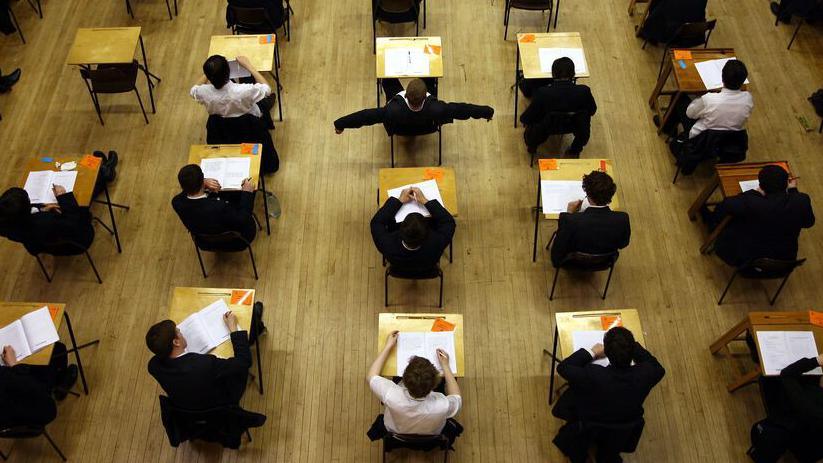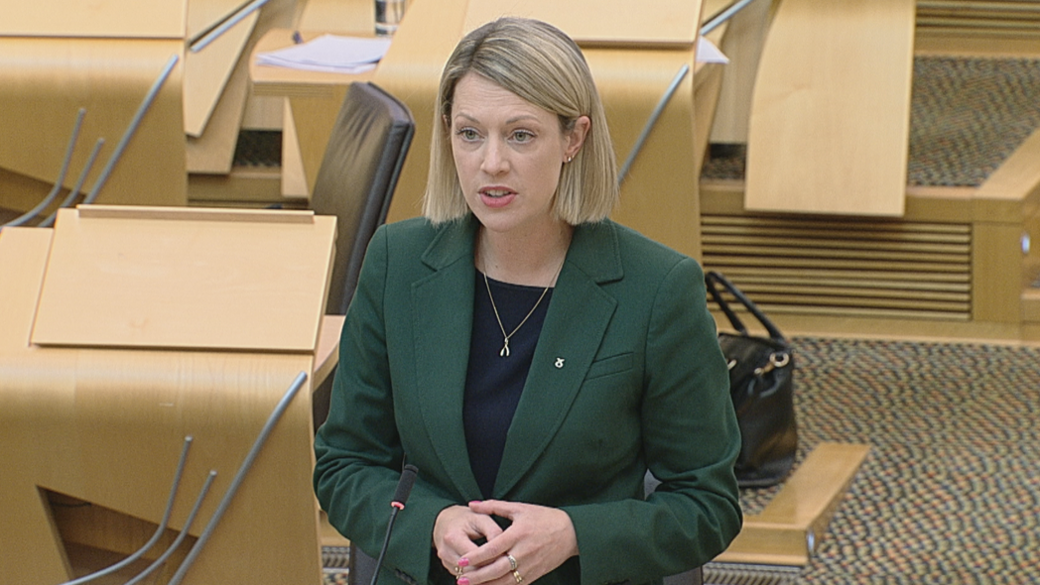School exams to play a smaller role in overall grades

Some subject exams could be scrapped by the next school year
- Published
Exams are to play a smaller role in the grades pupils earn at Scotland’s schools, the education secretary has said.
Jenny Gilruth was responding to a major report which recommended that students should not sit exams prior to fifth year.
She said exams would continue to play a part in most courses, but that more emphasis should be put on coursework and classroom assessment.
But some critics said the government had not gone far enough in implementing recommendations from the Hayward Review of Scotland's qualifications system., external
Gilruth said some of the review recommendations were a “longer term ambition” which needed more work.
Pupils should not sit exams before fifth year - report
- Published22 June 2023
Exams system needs 'radical' overhaul - Gilruth
- Published24 April 2023
The Hayward review, external was carried out for the Scottish government by one of Scotland's leading experts on education, Prof Louise Hayward.
The report, released last year, recommended that students should not sit exams before fifth year and argued for a wider range of assessment measures for Highers and Advanced Highers courses.
Prof Hayward's report also proposed the introduction of a Scottish diploma of achievement - a qualification or graduation certificate that would provide evidence of pupils' achievements.
Speaking in Holyrood, Gilruth said: "I agree with the report's recommendation that the balance of assessment methods in the senior phase should change to have less reliance on high stakes final exams.
"That means that in the future, internal and continuous assessment will contribute a greater percentage of a final grade that will support more young people to successfully evidence their learning and it will also act to increase the resilience of our overall approach to assessment.
"I want to be clear that taking steps to rebalance assessment does not mean that exams will be removed and I can therefore confirm that examinations will remain part of our overall national approach and will not be removed from all National 5 courses."
The education secretary added that some more practical subjects - including practical woodworking and fashion and textile technology - may have exams scrapped by the 2025-26 academic year.

Education Secretary Jenny Gilruth laid out the government's response in Holyrood
However Gilruth's statement was criticised by some opposition politicians, who felt it did not go far enough on the required scale of education reform.
And the Children's Commissioner Nicola Killean said her statement showed a "lack of commitment".
She said the education secretary's statement failed to mention set timelines or resources allocated to the next steps.
She added: "Too many children's and young people’s needs are not being met in our current system.”
Prof Louise Hayward said the statement marked the beginning of change, but added that reform should be an urgent priority.
She said: “Young people’s voices were central to the work of the review and the majority of young people were calling for change.
"Many described experiences in the senior school phase that were dominated by preparation for exams, past papers, prelims, memorising chunks of text or prepared answers.
"Some young people were insufficiently challenged, many were stressed and demoralised. Others felt excluded, believing their achievements were neither valued nor recognised."
She said that learners, parents, teachers and schools would all need time and support for change to be successful.

Ten years ago, the Scottish qualifications system went through a huge shake up.
Standard Grades – the direct descendent of O Grades – which were introduced in the late 1980s were scrapped. National 4 and 5 qualifications were introduced. Highers were modified but essentially remained.
Many within education argued that what really mattered was the student’s highest level of achievement in a subject by the time they left school – not what they achieved along the way. A National 5 was effectively redundant once a student obtained a Higher in the subject.
With this in mind, a few schools stopped routinely presenting students for exams in fourth year.
The vast majority of schools though simply replaced Standard Grades with National 4s and 5s. An academically able student would do Nat 5s in S4 then Highers in S5.
Those who argued for essentially maintaining the old pathway said that abolishing S4 qualifications could disadvantage those who wanted to leave school at 16.
People also said S4 qualifications gave students exams practice before their Highers.
So persuading some parents and employers that S4 qualifications are not needed could be difficult.